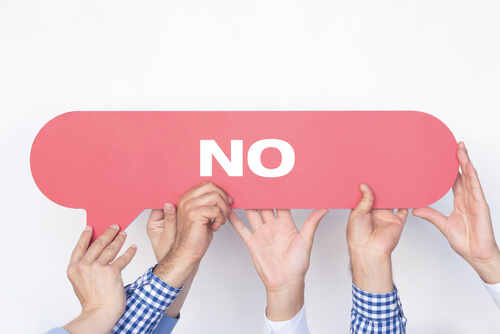The Value of Saying No (Assertiveness)


Reviewed and approved by the psychologist Gema Sánchez Cuevas
You probably find you often end up committing yourself to situations and tasks that you really don’t want to undertake. You’ve thought about saying no, and might even have it on the tip of your tongue yet, when the time comes, you just can’t say it. In this article, we’ll give you some tips to avoid these kinds of situations.
“When you say yes to others, make sure you aren’t saying ‘no’ to yourself.”
-Paulo Coelho-
Why’s it so difficult to say NO?
It’s a cultural issue. You haven’t learned to ask for or prioritize what you want. In fact, you’ve been taught to develop a passive attitude. This leads you to accept almost anything that’s suggested or asked of you, regardless of whether you agree or not.
Our cultural ideology has made you believe that, if you refuse, you’ll be considered rude or even a bad person.
This leads you to accept many situations that you really don’t want just to feel loved and accepted. The problem is that you have a great fear of being isolated or separated from others. That’s why you don’t allow yourself to give too many negative answers, even when you’d be totally justified in doing so.

Steps to saying NO
1. Know your limits. You need to understand your needs, desires, and limits. Then, you’ll learn what you’re willing to accept and know when to say NO.
2. Take your time before responding. Don’t be in a hurry to give your answers. It may be that, initially, you feel obliged to accept. However, when you think about the situation, you realize that you can actually refuse without any problems. Also, by taking your time, you can find a polite way to say no without feeling guilty.
3. Practice saying NO whenever you can. You may try to avoid these kinds of situations because you’re afraid of refusing. Don’t do it, it’s a mistake. Whenever you get the chance, and you really don’t want to do what others ask, just say NO. With time and practice, you’ll realize that these refusals won’t destroy your world or your interpersonal relationships.
4. Find alternatives. An option that’ll help you to say no is to give an alternative that suits you. For example, if a friend invites you to a party where you know you’ll feel uncomfortable, you can say no and propose another day to go out for coffee. In this way, your friendship isn’t affected and you avoid an awkward situation.
5. Reward yourself. Learn to reward yourself when you’ve finally learned to say NO without feeling guilty. Every little progress is important and valuable to you, so you must learn to really value them.
6. Stand firm. It’s not enough to learn to say NO if, later, you agree to do what you don’t want to. It’s really important that you learn to stand firm and not allow yourself to be manipulated by negative comments or attitudes.

The value of saying NO
Sometimes, you may feel uncomfortable giving a negative answer, but learning to say NO can set you free. It’ll stop you from having to deal with the kinds of things that really aren’t your responsibility yet have a tendency to keep you awake at night.
“Your time is limited, so don’t waste it living someone else’s life. Don’t be trapped by dogma- which is living with the results of other people’s thinking. Don’t let the noise of others’ opinions drown out your own inner voice.”
-Steve Jobs-
You probably find you often end up committing yourself to situations and tasks that you really don’t want to undertake. You’ve thought about saying no, and might even have it on the tip of your tongue yet, when the time comes, you just can’t say it. In this article, we’ll give you some tips to avoid these kinds of situations.
“When you say yes to others, make sure you aren’t saying ‘no’ to yourself.”
-Paulo Coelho-
Why’s it so difficult to say NO?
It’s a cultural issue. You haven’t learned to ask for or prioritize what you want. In fact, you’ve been taught to develop a passive attitude. This leads you to accept almost anything that’s suggested or asked of you, regardless of whether you agree or not.
Our cultural ideology has made you believe that, if you refuse, you’ll be considered rude or even a bad person.
This leads you to accept many situations that you really don’t want just to feel loved and accepted. The problem is that you have a great fear of being isolated or separated from others. That’s why you don’t allow yourself to give too many negative answers, even when you’d be totally justified in doing so.

Steps to saying NO
1. Know your limits. You need to understand your needs, desires, and limits. Then, you’ll learn what you’re willing to accept and know when to say NO.
2. Take your time before responding. Don’t be in a hurry to give your answers. It may be that, initially, you feel obliged to accept. However, when you think about the situation, you realize that you can actually refuse without any problems. Also, by taking your time, you can find a polite way to say no without feeling guilty.
3. Practice saying NO whenever you can. You may try to avoid these kinds of situations because you’re afraid of refusing. Don’t do it, it’s a mistake. Whenever you get the chance, and you really don’t want to do what others ask, just say NO. With time and practice, you’ll realize that these refusals won’t destroy your world or your interpersonal relationships.
4. Find alternatives. An option that’ll help you to say no is to give an alternative that suits you. For example, if a friend invites you to a party where you know you’ll feel uncomfortable, you can say no and propose another day to go out for coffee. In this way, your friendship isn’t affected and you avoid an awkward situation.
5. Reward yourself. Learn to reward yourself when you’ve finally learned to say NO without feeling guilty. Every little progress is important and valuable to you, so you must learn to really value them.
6. Stand firm. It’s not enough to learn to say NO if, later, you agree to do what you don’t want to. It’s really important that you learn to stand firm and not allow yourself to be manipulated by negative comments or attitudes.

The value of saying NO
Sometimes, you may feel uncomfortable giving a negative answer, but learning to say NO can set you free. It’ll stop you from having to deal with the kinds of things that really aren’t your responsibility yet have a tendency to keep you awake at night.
“Your time is limited, so don’t waste it living someone else’s life. Don’t be trapped by dogma- which is living with the results of other people’s thinking. Don’t let the noise of others’ opinions drown out your own inner voice.”
-Steve Jobs-
This text is provided for informational purposes only and does not replace consultation with a professional. If in doubt, consult your specialist.







